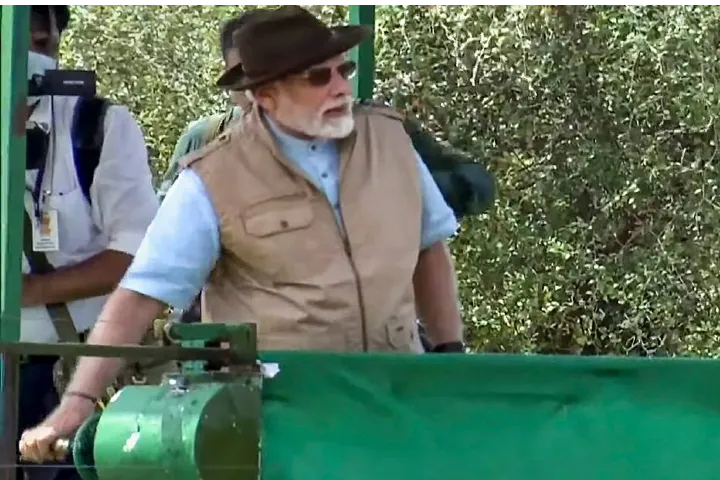

Prime Minister on his birthday today released cheetahs brought from Namibia in the Kuno National Park, Madhya Pradesh
Prime Minister Narendra Modi said, “It is a historic moment for India,’’ as he released cheetahs from Namibia into Kuno National Park in Madhya Pradesh on Saturday, bringing back the species to the country after it had become extinct seven decades ago.
“Project Cheetah is our endeavour towards environment and wildlife conservation. Kuno National Park was chosen for the release of cheetahs after detailed study by experts. Cheetahs will add to bio-diversity in Kuno, boost tourism and generate income for locals,” PM Modi explained.
He said tourists and wildlife enthusiasts will have to wait a few months before they can see cheetahs in the wild as the animals need some time to adapt to their new home.
“These Cheetahs have come as guests, unaware of this area. For them to be able to make Kuno National Park their home, we’ll have to give these Cheetahs a few months time,” he added.
“It is unfortunate that we declared cheetahs extinct from the country in 1952, but for decades no meaningful effort was made to rehabilitate them. Today, as we celebrate Azadi ka Amrit Mahotsav, the country has started rehabilitating cheetahs with a new energy,” he explained.
“Following international guidelines, India is trying its best to settle these cheetahs. We must not let our efforts fail,” the Prime Minister remarked.
The cheetahs were declared extinct from India in 1952 but today 8 cheetahs were brought from Namibia as part of ‘Project Cheetah’ and the government’s efforts to revitalise and diversify the country’s wildlife and habitat. The Prime Minister thanked the government of Namibia for enabling this to happen.
The eight cheetahs released today (5 females and 3 males) were brought in a cargo plane to Gwalior as part of an inter-continental cheetah translocation project. Later, the Indian Air Force choppers carried the cheetahs to Kuno National Park from Gwalior Air Force Station.
Radio collars have been installed in all the cheetahs to be monitored through satellite. Apart from this, there is a dedicated monitoring team behind each cheetah who will be monitoring their location for 24 hours.
Cheetahs will help in the restoration of open forest and grassland ecosystems in India and will help conserve biodiversity and enhance the ecosystem services like water security, carbon sequestration and soil moisture conservation.
Cheetah is said to be the fastest animal and can run at a speed of 100-120 km per hour. The habitat that has been selected in Kuno is very beautiful and ideal, where there are large grasslands, small hills, and forests and it is very suitable for cheetahs. Heavy security arrangements have been made in Kuno National Park. Arrangements have been done to prevent poaching activities, according to SP Yadav, head of the Cheetah project.
Under the ambitious Project Cheetah of the Indian government, the reintroduction of wild species particularly cheetah was undertaken as per the International Union for Conservation of Nature (IUCN) guidelines.
India has a long history of wildlife conservation.
One of the most successful wildlife conservation ventures ‘Project Tiger’, which was initiated way back in 1972, has not only contributed to the conservation of tigers but also of the entire ecosystem.
The reintroduction of cheetahs represents another major step forward in this direction and is a milestone in the history of wildlife conservation in India.
India decisively asserted its military superiority over Pakistan during this month's brief but intense conflict,…
Trade associations and local business groups in Pakistan-occupied Gilgit-Baltistan (PoGB) launched an indefinite protest on…
A human chain and protest march was organized by various organizations in front of the…
The United States on Saturday announced the expansion of its security partnerships with India through…
Highlighting the use of indigenous platforms during Operation Sindoor, Chief of Defence Staff (CDS) General…
Congress MP Shashi Tharoor on Friday (local time) said that Colombia will issue a statement…